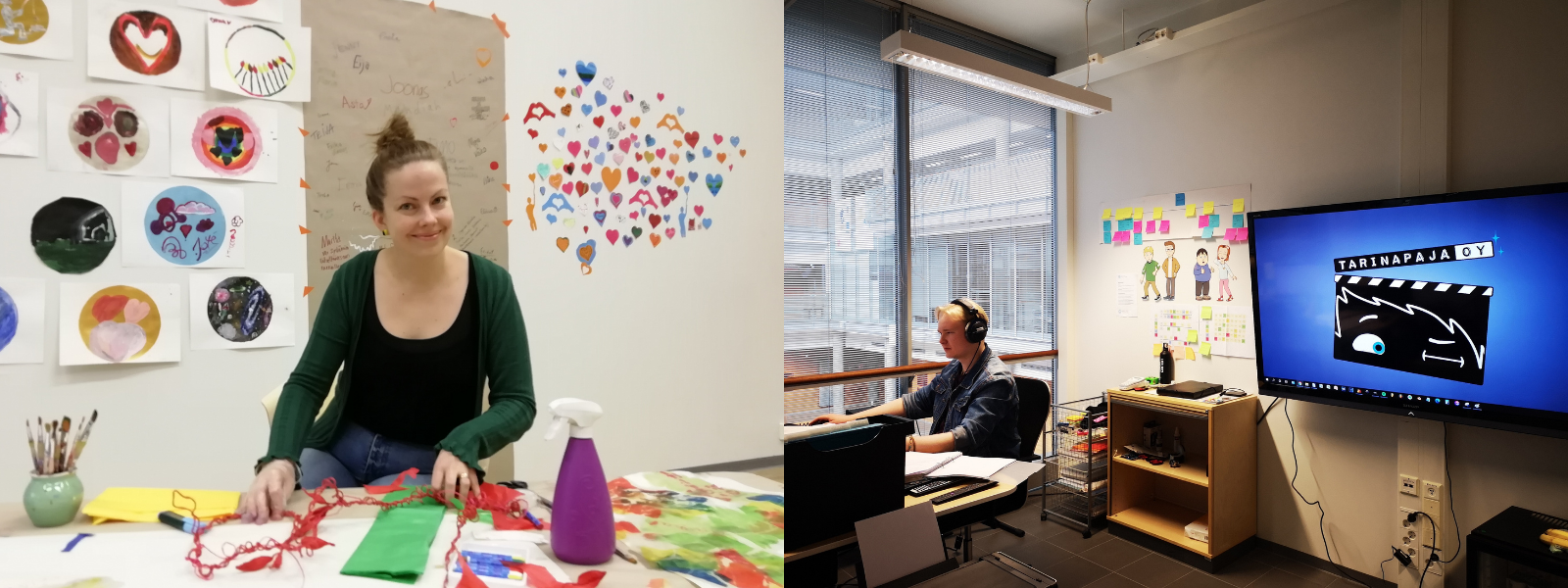Start-ups networking and cooperating with the University of Lapland

A design center and network called ARCTA - Arctic Art & Design Labs, is built around the expertise of the Faculty of Arts of the University of Lapland. ARCTA provides services especially for startups and SMEs in the region, as well as public service organizations in the early stages of product development. The services include practical support for various design projects and the development of design services.
The University of Lapland coordinates and provides business premises for startup entrepreneurs. Laboratories and university facilities offer opportunities for business cooperation and the innovation of new products or services. Examples of two startups working in ARCTA and doing close cooperation with the University of Lapland are Tarinapaja Oy and Silhaus.
Tarinapaja Oy
Production company and creative studio Tarinapaja Oy was founded in 2017. Tuomas Toivainen, the founder of Tarinapaja, started making the animated series Crazy - Crazier - Junior High already in 2014 and did for the first season almost everything from animation to composing the music by himself. The company was established after more animators and a work group were needed to make the series. Today, the series is a co-production of Tarinapaja Oy and Animagency and employs several experts in the field.
In the spring 2021, Toivainen organized an animation course at the University of Lapland for those interested in animation. The course originated from Toivainen’s own idea of employing and bringing skilled people and creative know-how of Lapland together. The course is a good example of cooperation between Tarinapaja and the University of Lapland, and similar activities are planned to be organized also in the future. University of Lapland offers good opportunities and facilities for such cooperation.
Tarinapaja’s premises are located in ARCTA, Arctic Art & Design Labs of the University of Lapland, together with other startup entrepreneurs. While working, Toivainen also studies audiovisual media culture himself. The facilities of the University of Lapland provide a platform to work, meet and network with other inspiring and like-minded people. The possibilities for cooperation are limitless.
At the moment, COVID-19 is restricting the operations, and- overcoming the pandemic is already an issue for many companies. Face-to-face networking is not as accessible as was before. Luckily Toivainen’s animation course was possible to be implemented as contact teaching, which was the highlight of restricted everyday life during the pandemic for many students. Now we work together and try to survive through the pandemic, says Toivainen.
Silhaus
Silhaus is a startup company that has been operating since 2016. Silhaus is producing applied and participatory art to be easily accessible. Art activities have been developed f.ex. in the assisted living homes for the elderly and in children’s cultural network of the city of Rovaniemi. According to research, art increases overall well-being. The aim of Silhaus is to bring art and culture into the everyday lives of organizations and to introduce a new kind of operating culture. Art can deepen the experiences in the events or boost innovative development work. Silhaus' target groups are children and youth, the elderly, work communities and companies.
Silhaus has been collaborating tightly with the University of Lapland which has benefitted the company.
– My industry is still developing and new, so there are several areas of cooperation with the university, says Niina Oinas, the founder of Silhaus. The cooperation has brought new networks and Silhaus has been involved in planning various projects aiming at developing and instilling the industry. Project plans have been related to bringing art into social, health care and welfare services.
Silhaus has an office in ARCTA, Arctic Art & Design Labs -of the University of Lapland. Oinas was attracted by the ARCTA's workspaces and a more social working environment compared to a home office. The university can contribute remarkably to this new and evolving field in promoting the arts through research and education.
Oinas is particularly interested in the role of research in developing the field. The role of arts is constantly developing around the world.
– In a way, internationalisation has been in mind, but first we need to clarify the industry and make it more sustainable within the Finnish society, says OInas.